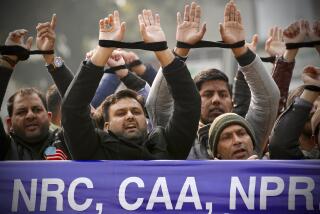BRITAIN : There’s No National ID Crisis Yet, but It May Be in the Cards : Civil rights groups and law-and-order proponents square off as Tory minister’s proposals spark outcry--mostly negative.
- Share via
LONDON — The government has launched a countrywide debate on the introduction of something many citizens believe is alien to the British way of life: national identity cards.
After months of study, Home Secretary Michael Howard has thrown open the issue of identity cards to public discussion, and it has provoked an outcry, mainly negative.
Proponents of law and order tend to favor compulsory ID cards, while civil rights groups staunchly object to them.
Like Americans and Canadians--and unlike citizens of most countries in Western Europe--Britons have never had to carry identity cards. They use passports only if traveling abroad and are not photographed for their driver’s licenses.
The government has suggested several variations: a voluntary card, a photograph driver’s license, a combined driver’s license and identity card and a compulsory card. So keen is public interest in the issue that Howard decided to launch an official debate that could eventually reach Parliament.
Proponents say the cards would:
* Ease travel within the European Union, particularly if the cards are smaller than a passport.
* Provide proof of age in commercial transactions. Young people could show they were old enough to buy cigarettes, alcohol or certain videos, old people that they were eligible for reduced fares.
* Facilitate the use of checks or credit for retail purchases.
* Contain medical information useful in an emergency.
The cards could also make it easier for police to determine identities of victims, suspects or witnesses.
As the government paper explaining the cards put it: “It can be argued that law-abiding citizens with nothing to hide should have nothing to fear from an identity card.”
And some authorities argue that compulsory cards would regulate access to social services and state benefits, assist in the fight against terrorism and help control illegal immigration.
On the other hand, the national plan would cost an estimated $750 million to $1 billion, and the government would have to consider whether to make it a criminal offense not to acquire an identity card.
The Home Office would also have to decide whether police should be allowed to demand proof of identity without a clear reason--a power they do not now have. Government officials acknowledge that this could harm police-community relations.
Civil rights advocates argue that the cards could be used against minority groups, whose members are said to be four times more likely than whites to be stopped by the police for questioning.
And some Conservative members of Parliament are opposed to what they regard as unjustified interference by the state in the lives of citizens.
Tory lawmaker Michael Stern declared that there is “no way” Parliament would back the plan.
Labor legislator Jack Straw, Home Affairs spokesman, said, “We are opposed to the introduction of compulsory ID cards, which are alien to the British tradition of strong individual liberty.”
*
And one young woman working in London said: “All my friends hate the idea of compulsory identity cards. It would be just one more way the government could harass young people. There’s enough as it is.”
Howard has taken a neutral stance on the issue, observing: “The prime minister has never said he is in favor of compulsory identity cards. What he has said is that he sees distinct and decided advantages, and we need to test those arguments and see whether they really do afford decisive advantages to people compared with the problems that arise.”
More to Read
Sign up for Essential California
The most important California stories and recommendations in your inbox every morning.
You may occasionally receive promotional content from the Los Angeles Times.













